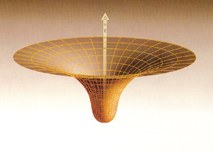Scientific Impact
Texts by Professor Alberto Galindo Tixaire
The influence of Einstein's work in physics has been enormous. It spans from the smallest (standard model of elementary particle physics, with the theory of relativistic quantum fields as a framework) to the largest (the structure of the Universe, with general relativity ruling the global geometry and dynamic evolution in cosmology). From the simplest (the gyromagnetic ratio of the electron) to the most complex (the collapse of a supernova). From the lowest energies (Bose-Einstein condensates at temperatures as low as a few nanoKelvin) to the highest (the quark-gluon plasma). From the commonest application (global positioning system) to the most sophisticated techniques (non-linear atomic optics).
Einstein's impact is not restricted to physics and associated disciplines. His ideas have also made a mark on modern culture from art to poetry. They have shaped the theory of knowledge and philosophy as well. Einstein rejected an empirical explanation for the origin of physical concepts, which he considered a free creation of the human mind. But mere logical thinking does not provide us with knowledge of the external world, which only experience gives us. Nevertheless, concepts help organise sensory experiences and, so far, Nature has always appeared on the side of simplicity and mathematical beauty.
Along with Leibniz and Planck, he believed and sought a pre-established harmony. In the realm of philosophy, relativity theory forced philosophers to revise their conception of space, time and matter, and later, to take party on the local realism which impregnated the critical position of Einstein on quantum physics. Experimental results appear to stubbornly reject this position (albeit without the strength required to convince sceptics).

A representation of the expansion of the universe
